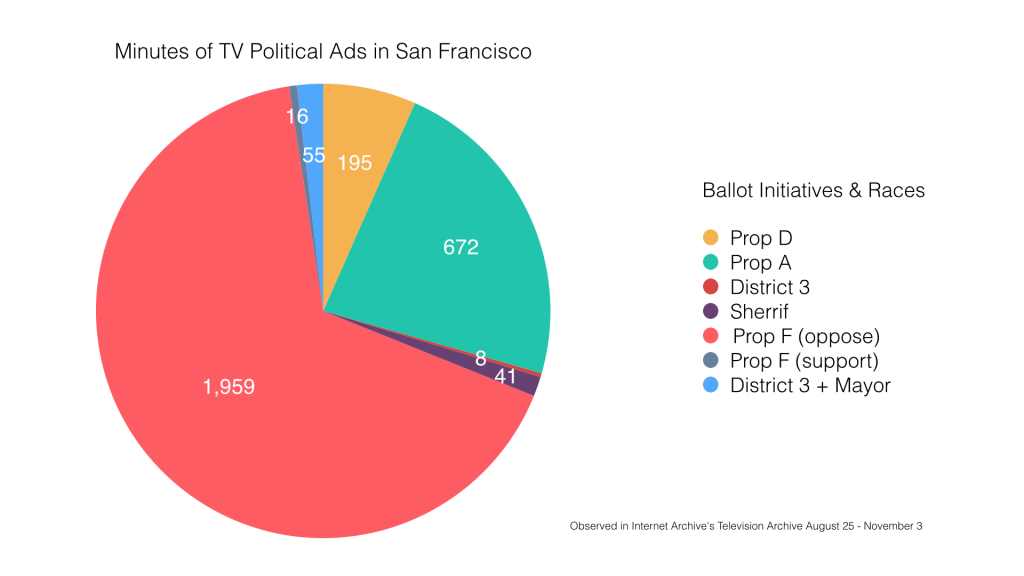Based on algorithmic analysis, Pro-Airbnb advertising dominated political TV ads in San Francisco in the weeks leading up to Election Day. Two thirds of the minutes devoted to political ads on several initiatives and races before voters focused on arguments against a proposal to curb the company’s operations in the city, according to a review of the Internet Archive television archive. Voters ended up rejecting Proposition F, whose opponents claimed it would encourage neighbors to spy on each other and increase lawsuits, by a margin of 55 to 45 percent.
The Archive identified total of 1,959 minutes of ads (4,591 plays) opposing Proposition F, out of 2,895 minutes devoted to all political TV ads, or roughly two thirds of the air-time.
To put that in perspective, Mayor Ed Lee, who won his reelection easily, was the subject of only 55 minutes of ads. Though he appeared in and narrated hundreds of ads supporting Propositions A and D, the only ads that mention his mayoral race were airings of a support ad paid for not by his own campaign, but rather by an independent expenditure from Clint Reilly, a local real estate developer and former professional political consultant.
Samples of all ads found to be related to 2015 San Francisco elections can be viewed here, and metadata about those that occurred in archived television can be downloaded from this page.
The only political ad that aired on television in support of proposition F was this one, which was observed for a total of 16 minutes between October 16th to 25th. The ad, which features a parody of the Eagles’ song “Hotel California,” was pulled from Youtube and the ShareBetterSF campaign website because of claims of copyright infringement. Dale Carlson, a spokesman for the campaign who contacted the Archive, wrote “We believe the ad is parody and did not constitute a copyright violation. But it had already run its course and we weren’t going to spend money on legal bills to defend an ad that was already off the air.”
In all, the Archive identified 14 unique ads opposing Proposition F that aired on TV. In the final days of the campaign, the opponents devoted airtime to this ad that calls the proposal “too extreme,” quotes from the San Francisco Chronicle, and cites high profile opponents such as Lt. Gov. Gavin Newsom, Mayor Lee. This 30-second ad aired 423 times on 10 channels in San Francisco (CNBC, CNN, FOXNEWS, KGO, KNTV, KOFY, KPIX, KRON, KTVU, MSNBC).
This review updates an earlier one issued last week focused exclusively on Airbnb ads, broadening the analysis to include all political TV ads aired from August 25th through November 3. The Archive identified ads through a number of sources, including SFGov’s Summary of Third Party Expenditures Regarding San Francisco Candidates hosted by the City of San Francisco. An audio fingerprint was created for each ad and used to find matches in some 35,000 hours of archived local station programming and cable news network shows available in the San Francisco region. The Internet Archive’s television news research library presents public opportunities to search, compare and contrast news programs in its archive. Entertainment programming is only available for select algorithmic study within its server environment.
The Internet Archive’s review of political TV ads relating to Proposition F is part of experimentation in preparation for our new Knight Foundation funded project to track political TV ads in key primary states. Stay tuned for news about our December launch.
Research by Trevor von Stein
